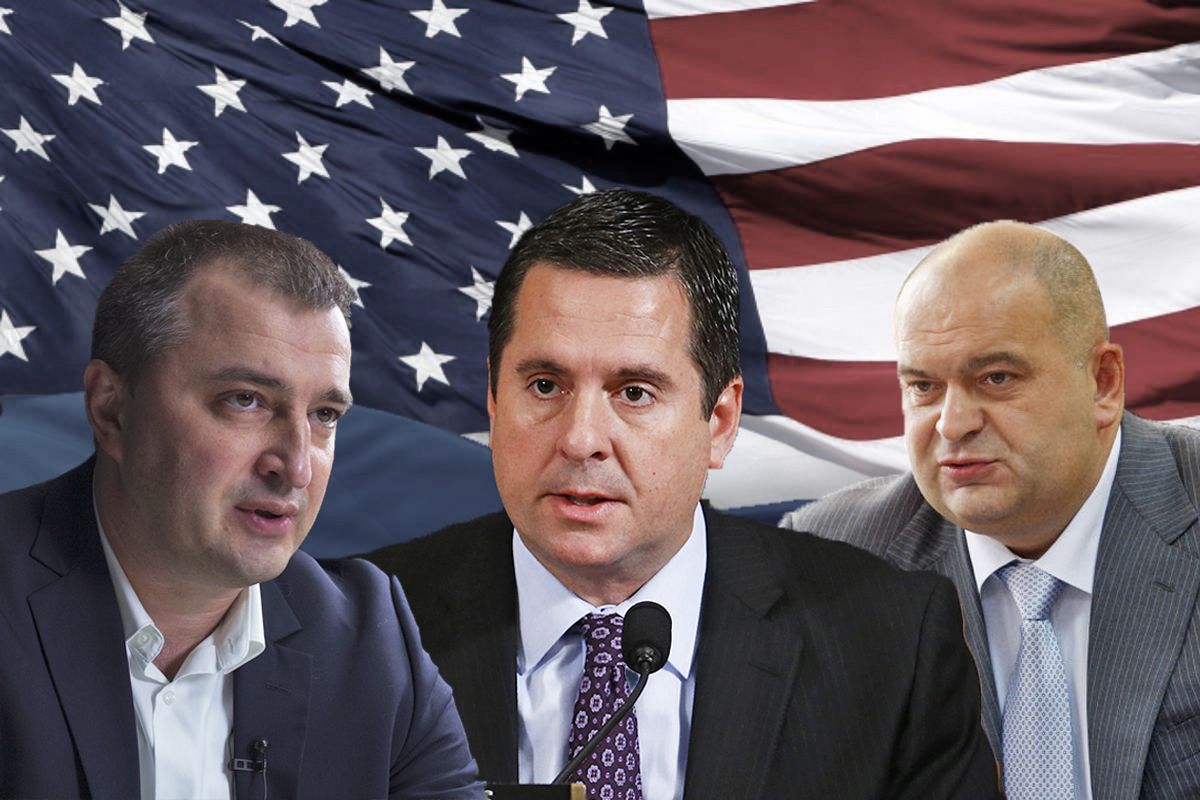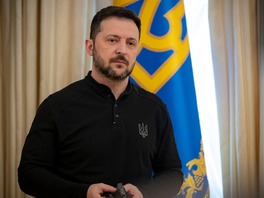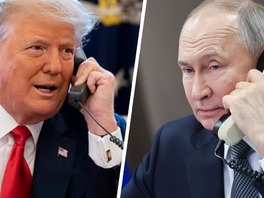The Ukraine-US saga has unraveled a new twist: lead prosecutor on the Zlochevsky case issued a note of suspicion indicating Hunter Biden’s company – after allegedly having a phone conversation with Devin Nunes’ aide Derek Harvey. Caught in a crossfire of the US’ political struggle, Ukraine’s public officials have a difficult time remaining neutral in what became known as the “Ukrainegate” scandal.
Whilst key inquiry witnesses testified in Congress – confirming the alleged quid pro quo: Burisma and 2016 investigations for a White House meeting – Kyiv hosted an intriguing press conference called “New facts about international corruption, Burisma and a scheme that would lead Ukraine to bankruptcy”. Breaking news of the day: Mykola Zlochevsky – co-owner of the gas company Burisma, which employed Joe Biden’s son – was issued an edited note of suspicion on November 14. This time, the official document involved an explicit mention of Hunter Biden’s company – Rosemont Seneca.
The developments in the investigation requested by President Trump, however, weren’t the only fascinating turns in the Ukrainegate whirlwind. The story lived to reveal another plot twist: according to Lev Parnas’ lawyer Joseph Bondy, House Intelligence Committee Republican and one of the main Donald Trump defenders, Devin Nunes, had Parnas organize a phone call with a Ukrainian prosecutor named Konstantin Kulik. Until fired on November 22, Kulik had been the prosecutor responsible for a case against Burisma’s Mykola Zlochevsky. Interestingly, Mr. Kulik first signed the Zlochevsky note of suspicion in March – the same month he allegedly had a conversation with Derek Harvey, former Trump advisor and Nunes’ aide.
Did Ukraine agree to Trump’s investigations, playing right into Republicans’ hands, or is it all merely the country’s awkward attempt at strengthening its anti-corruption efforts? “Apostrophe” gathered new facts and analyzed the matter.
Intriguing coincidence: Biden Jr.’s company mention in a suspicion note amid Congress hearings
Two curious events took place on Wednesday, November 20. First of all, Ambassador Gordon Sondland testified in Congress. Considered one of the most pivotal witnesses, Sondland shared his knowledge on the Ukraine pressure campaign and confirmed the scandalous quid pro quo. The ambassador asserted that he was working with Rudy Giuliani on the "express direction of the President of the United States”, highlighting that “everyone was in the loop” regarding the President’s request: Burisma and 2016 investigations for a White House visit. Notably, Sondland said that, in his understanding, Zelensky "had to announce the investigations," yet "…he didn't actually have to do them."
Secondly, Ukraine’s MPs Oleksandr Dubinsky and Andrii Derkach held a thought-provoking press conference at the “Interfax” news agency in Kyiv. While the primary point was unveiling a grand international corruption scheme, which would “lead to Ukraine’s bankruptcy as soon as late 2020 or early 2021”, the emphasis was also put on Burisma. Dubinsky and Derkach informed the journalists that Mykola Zlochevsky was issued a new, edited note of suspicion, which, in turn, involved a specific mention of Rosemont Seneca – a consulting company co-founded by Hunter Biden. In particular, the document reads that $3 404 712,82 of Zlochevsky’s illegally obtained funds were transferred from Burisma to Rosemont Seneca’s account for legalization between 11/18/2014 and 10/16/2015. It’s worth noting that Oleksandr Dubinsky serves as an MP with the “Servant of the People” party, which is President Volodymyr Zelensky’s political force. Interestingly, at the press conference, both MPs highlighted that Burisma and Biden Jr. weren’t the focus of their event, making the journalists asking Biden-Giuliani-Burisma questions sound like “fake news” merely looking for a sensation. The two, however, explicitly included Burisma in the press conference’s name and all the social media posts. Thus, while the investigation may truly be a part of Ukraine’s long pursued anti-corruption work, the new developments easily make it a probe requested by Donald Trump.
The document’s legal flaws and Derek Harvey’s alleged phone call with Prosecutor Kulik
As CNBC reported, Devin Nunes hired Rudy Giuliani’s Soviet-born associate, Lev Parnas, to arrange a Skype meeting with the special anti-corruption prosecutor Nazar Kholodnytsky and a phone call with Prosecutor Konstantin Kulik. The conversations allegedly occurred in late March. According to Joseph Bondy, Parnas’ lawyer, prior to online meetings Nunes’ staff canceled a trip to Ukraine after realizing they would have to report the visit to Adam Schiff. Derek Harvey, a former Trump adviser who now works for Devin Nunes, represented his boss on these calls. Parnas’ lawyer has also revealed that Mr. Nunes and his aides traveled to Vienna in late November last year to meet with Ukraine’s former prosecutor Viktor Shokin.
 Devin Nunes' aide Derek Harvey (in the back)
Devin Nunes' aide Derek Harvey (in the back)
Fun fact: until fired on November 22, Prosecutor Kulik had been the one responsible for Mykola Zlochevsky’s case. In his exclusive interview with “Apostrophe”, Kulik highlighted that he first notified Zlochevsky of suspicion precisely in March. “What Trump impeachment? What calls to Zelensky if it all had already been registered in March? Why would you force anyone to do anything if it had already been done?” the prosecutor wondered. Konstantin Kulik was also the one to sign a new suspicion note on November 14.
Notably, the November document was called “Notification of a change to a previously issued suspicion”. Meaning, it has been edited since March – amid key impeachment hearings, with Nunes as House Intelligence Committee ranking member and Donald Trump’s vocal supporter. We do not know if there were mentions of Rosemont Seneca in the initial March version (“Apostrophe” requested to see the original note, but we are yet to receive an answer). The edited document, however, includes Biden Jr.’s business. In particular, it states that a part of Zlochevsky’s illegally obtained funds was transferred from Burisma to Rosemont Seneca.
 Notification of a change to a previously issued suspicion - November 14, 2019
Notification of a change to a previously issued suspicion - November 14, 2019
While analyzing the indicated document, “Apostrophe” remarked that the new note of suspicion, dated from 11/14/2019, appears rushed specifically in a place that indicates Hunter Biden’s business: the numbers are off, and so is the differentiation between individuals and legal entities.
In particular, the document – signed by the Prosecutor General’s Office – alleges that the funds were transferred to the accounts of four individuals. The statement is followed by a list of according transactions. It, however, includes only three accounts instead of four – one legal entity and two individuals, with the legal entity being “ROSEMONT SENECA BOHAI LLC” ($3 404 712,82 transferred).

Thus, it appears that either the prosecutor – working for the Prosecutor General’s Office – lacks basic competency and is unable to tell a difference between three and four (as well as the difference between an individual and legal entity), or this paragraph was edited in a hurry.
While anti-corruption efforts are more than welcome in Ukraine, the timing and the document’s quality raise a series of sensitive questions. For instance, one could wonder if the “edited” note of suspicion had the Rosemont Seneca part added amid damning testimonies in Congress, as well as whether Devin Nunes’ team has been in contact with the lead prosecutor on the Zlochevsky case since March.
Ukraine’s failure to remain neutral
After Ukraine’s earlier attempts to “remain Switzerland”, it looks like Volodymyr Zelensky’s government is leaning toward cooperation with Republicans. In addition to a series of known Giuliani-Yermak back-channel conversations, there are allegations of Nunes’ staff being in touch not only with Kulik but also with the Prosecutor General Ruslan Ryaboshapka. Markedly, on a July 25 phone call, Zelensky described Ryaboshapka as “100% my person”. Assuming Parnas’ lawyer is truthful regarding the alleged communication – and Joseph Bondy stressed his client is ready to testify under oath – one may wonder if President Zelensky knew of these phone meetings.
The unofficial contact continued with Andriy Yermak’s meeting with former communications director of Donald Trump’s transition team Bryan Lanza. The two met at a Kyiv restaurant on November 13 around 10 pm. The subject of their conversation is unknown.
Then, on November 14, Ukraine’s Minister of Foreign Affairs Vadym Prystaiko told the journalists that he “didn’t recall any conversations” with him as with the Minister of Foreign Affairs regarding the alleged aid-for-investigations quid pro quo. He concluded that, as Gordon Sondland never talked to him about it, any conversations that might have occurred (or not) weren’t with official government representatives. While Ambassador Sondland did, in fact, later testify that he didn’t connect military aid to the investigations at the time, it’s worth noting that Vadym Prystaiko only assumed his position on August 29. Most of the events discussed in the impeachment inquiry took place before he became the Foreign Minister, and Politico had already broken the news of aid freeze on August 28. Thus, it is only logical that Prystaiko wouldn’t have been the contact point – which doesn’t necessarily dismiss other contacts on the matter. Therefore, Mr. Prystaiko couldn’t have been 100% certain at the time he gave his comment on the quid pro quo, and yet he was rather adamant in his conversation with the reporters. Donald Trump, of course, has quickly picked up the message and spread it on Twitter.
Though many questions asked in this article are, as stressed, only questions, they are rather critical ones. While it’s up for authorities to decide if Hunter Biden’s company received any illegal funds, the potential connection between Nunes’ staff and the lead prosecutor on the Zlochevsky case may cause no lesser damage than Biden Jr.’s activity in Ukraine. Could Devin Nunes go too far in his attempts to defend the President, inflicting more harm than good in the process? At the same time, did Ukraine get in way over its head in the foreign state’s affairs? If you play with fire, you might get burned – and this saying appears true for all sides of the scandalous Ukrainegate saga.





